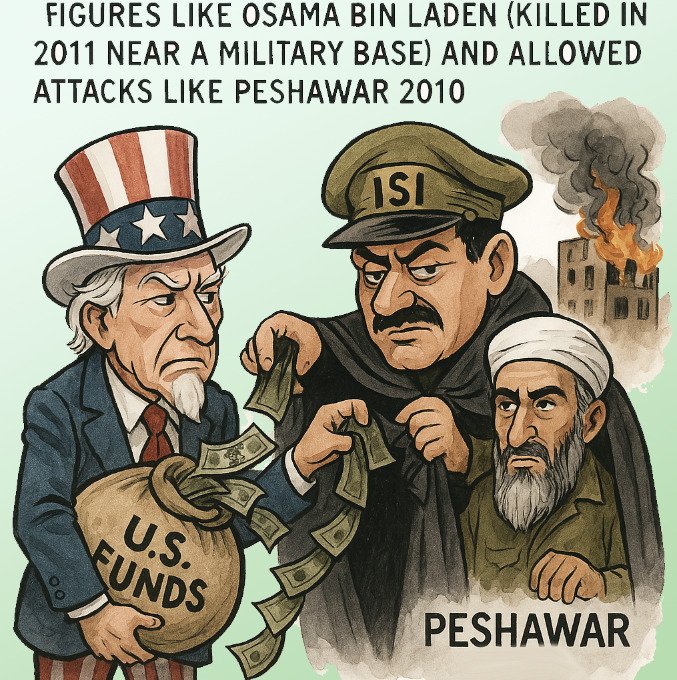Pakistan lives in a world of dismal and disgusting denial. Unfortunately, its ostrich syndrome manifests in the form a consistent refusal to acknowledge Pakistanis. Whether they are its citizens, terrorists, or soldiers – Pakistan loves to abandon them. Thus, underscoring a troubling pattern of abandonment and strategic manipulation. From the Kargil War to Kasab to the Attari border closures, these actions reveal a disregard for human dignity and international norms – while the IMF and UN fill its NaPak pockets with loans and funds.
1999 Kargil War: Denial and Disrespect
During the 1999 Kargil conflict, Pakistan’s military strategy involved the infiltration of Pakistani army troops into Indian territory, masquerading as terrorists and “mujahideens”. The 3-day conflict turned the tide in the favor of India. Consequently, these soldiers lost their lives fighting a Pakistani war disguised as an internal conflict for Bharat.
For years, Pakistan denied their involvement. They even refused to accept the dead bodies of soldiers.
In September 2024, Pakistani General Asim Munir said in a public speech that Pakistani soldiers were part of the Kargil campaign. Thereby, acknowledging Bharat’s truth after more than two decades. After the artillery smoke and fire died out, India upheld the sanctity of the fallen soldiers and buried them in Pakistan’s flag with full Islamic rites.
Pakistan’s denial of the soldiers’ existence is a normal part of its military strategy. It not only disrespected the soldiers’ sacrifices but also caused anguish to their families. The refusal to acknowledge its role in Kargil, Pakistan deprived its fallen men of martyrdom for following orders and deprived their families of closure.
Kasab: The Soldier Pakistan Never Claimed
Ajmal Amir Kasab was not just another terrorist. He was a Pakistani state-sponsored weapon. Kasab was trained in Pakistan by the Lashkar-e-Taiba, armed with military-grade equipment, and brainwashed in the ideology of jihad. He and his team stormed Mumbai on 26 November 2008 with one goal: mass murder. Thanks to Sargent Omble, Kasab was the only attacker captured alive.
Yet, despite irrefutable evidence – Kasab’s own testimony, intercepted phone calls with Pakistani handlers, and the Pakistani origin of his village Faridkot – Pakistan refused to acknowledge him as its citizen.
Why? Because Kasab was a disposable pawn. A deniable asset and the perfect embodiment of Pakistan’s terror doctrine: train them, use them, and if caught, disown them.
Even after India offered to return Kasab’s body post-execution, Pakistan refused. They didn’t want a grave that would remind the world of their complicity in the 26/11 Mumbai Attack. They didn’t want martyrdom to be claimed publicly for a man who was just a cog in their terror machinery.
Kasab, like the Kargil Pakistani soldiers was forgettable tool in the hands of a state that thrives on asymmetric warfare and plausible deniability.
Citizens of Pakistan: Left Stranded at Attari Border
On 22nd April 2025, a Pakistan-sponsored terrorist attack in Pahalgam ensured an end to Indo-Pak diplomatic relations. India took stringent measures, like the Indus Water Treaty abeyance, suspending visas, and closing the Attari-Wagah border.
While India continues to identify and ensure the exit of Pakistani nationals, Pakistan has closed its side.
Thus, leaving its citizens stranded in India. These 300 individuals, including women and children, possess valid Pakistani documentation. Yet, Pakistan’s refusal to accept its people mirrors its earlier disownment of Kargil soldiers.
To many, Pakistan’s actions appear to be a strategic maneuver. By leaving its citizens in India, it potentially aims to all or some of these:
- Create an international human rights violation and force the world to focus on the Indo-Pak tensions.
- Help its sleeper cells stay within India for intelligence operations during times of crisis.
- Burden India with the responsibility of caring for Pakistani individuals. Thereby, creating international sympathy and portraying India in a negative light.
These tactics not only strain India’s resources but also serve Pakistan’s broader geopolitical objectives.
International Community – Funds Flow without Accountability
Despite Pakistan’s actions and reputation as a terror-funding nation, international bodies like the United Nations and its subsidies continue to provide substantial aid. In 2025 alone, the UN allocated $108 million to Pakistan, with an additional $1.3 billion as loan with IMF under review on the 9th of May.
This funding persistently flows into Pakistan despite evidence of misuse of resources and support for terrorism.
The human rights community issued a warning against Pakistan’s treatment of Baloch protesters a few days back. Yet, today the UN released funds for tourism development and women/children of KPK! The international community fails to hold Pakistan accountable every time. The duplicitous and subconscious acceptance of Pakistan’s violation of human rights is evident to all. Why does the US or World Bank not freeze funds to the nation contingent upon adherence to humanitarian norms and rejection of terrorism? Why is no human rights body asking Pakistan to repatriate its citizens?
Pakistan’s repeated refusal to accept responsibility for its citizens and soldiers reflects a pattern of abandonment and strategic manipulation. These actions not only violate international norms but also undermine regional stability.

India and the global community must recognize and address this behavior, ensuring Pakistan takes back the people that hold its citizenship – whether it wants to or not!


